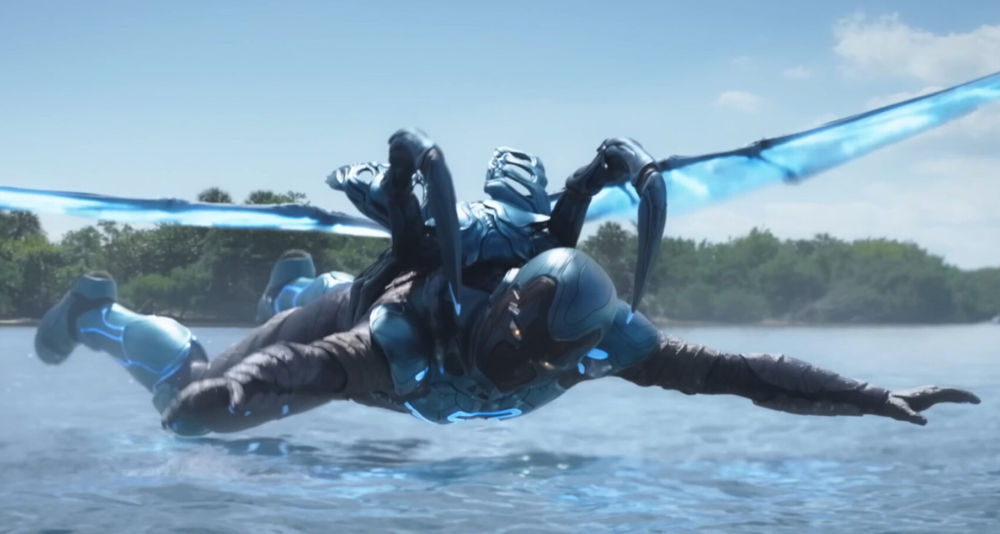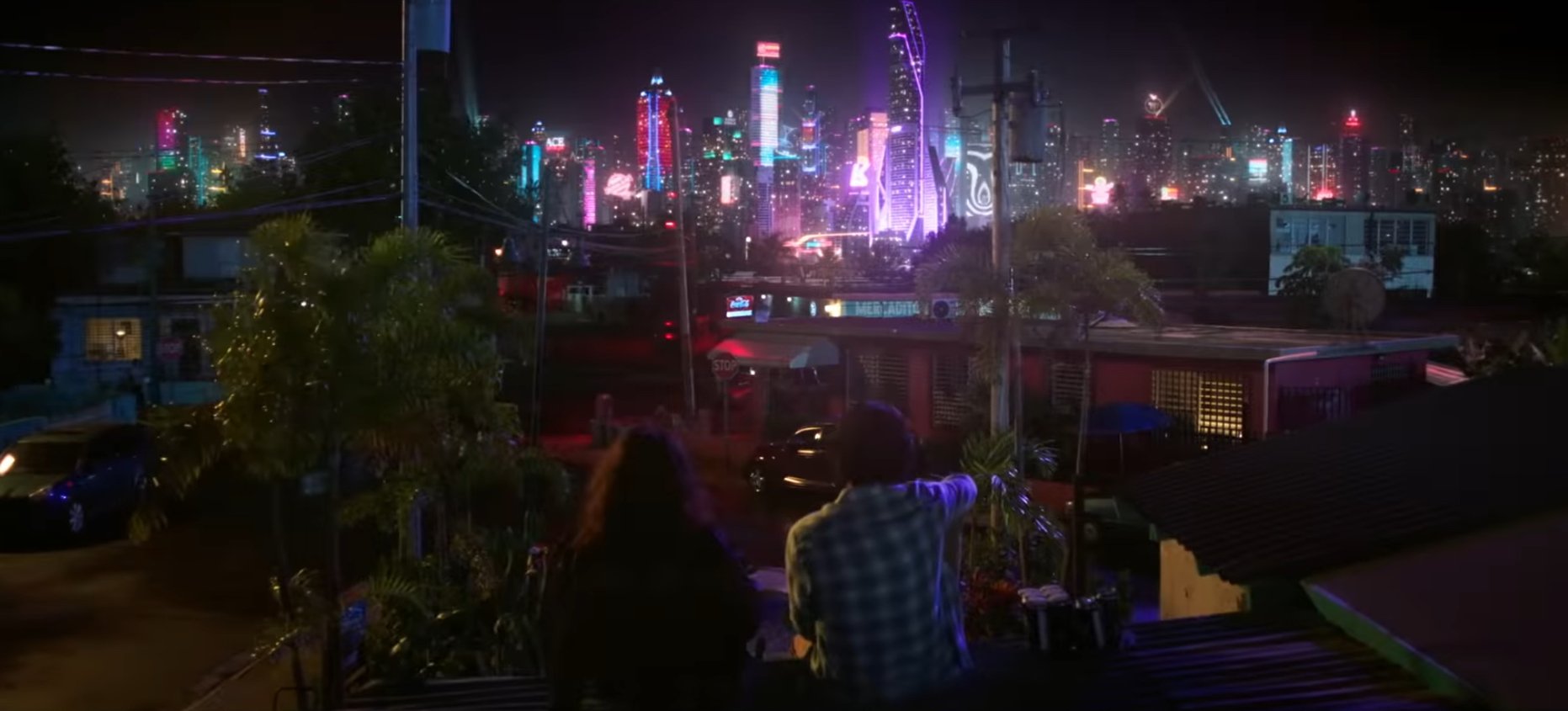Blue Beetle: A DCEU Retrospective (Part 15)
Rating – 7/10
**SPOILERS**
The DC Extended Universe is finally crawling to a stop, with only a couple more releases being sent out for Warner Bros Discovery to try and make back some money on. At this point, audiences paid pretty much no attention. This was all going to get rebooted soon anyway, why buy a ticket for it?
Well, the thing is, it was still a little unclear what was being rebooted and what wasn’t. James Gunn and Peter Safran had announced their new DC Universe as a “soft” reboot and a spiritual successor, rather than a full blown reset. Gunn’s TV show Peacemaker (following John Cena’s character from The Suicide Squad),was already confirmed to be getting a second season that would be canon to the DCU. This essentially confirmed Season 1 (and a significant portion of The Suicide Squad) would also remain canon (Gunn has since confirmed any aspects of those plots which are referenced in the future and aren’t contradicted should be considered canon. Also I’m not reviewing Peacemaker. I don’t have time for all that. (It is really good though). Furthermore in 2023, while it was reiterated that Henry Cavill and Ben Affleck were out, Jason Momoa, Ezra Miller (before the crime spree), Gal Gadot, and Zachary Levi were all offered opportunities to reprise their roles, and James Gunn himself stated that The Flash and the upcoming Aquaman sequel would tie into the now DCU. However, box office failures, the cancellation of Gadot’s third Wonder Woman film, Ezra Miller losing it, and various reports would cast doubt on all these.
Eventually, after a series of confused fan debates, conflicting reports, and box office failures of Shazam! Fury of the Gods and The Flash, James Gunn confirmed no actors from the DCEU were expected to reprise their roles in the rebooted franchise. However, Blue Beetle was an outlier.
Blue Beetle was originally announced as a mid-budget HBO Max exclusive release alongside Batgirl, before director Ángel Manuel Soto impressed studio execs enough with his creative vision (the team behind the film had been hoping to get bumped up to a theatrical release, and as a result shot the film for big screen suitability). Prior to the announcement that Gunn and Safran would take over and pivot towards a reset for the DCEU, Blue Beetle was given an August 2023 release date. As the reset was announced and the status of various characters and portrayals got increasingly confusing, James Gunn would confirm in June that Blue Beetle would in fact return to the DCU and still be played by Xolo Maridueña. So great, it’s canon! Until Gunn followed that post up with the announcement that until the DCU fully begins, nothing is truly canon, and the events of the film should be considered “disconnected”.
Great. Thanks James. Back to square one.
I imagine that this non-clarification did not help the box office of Blue Beetle (at this point it should not be a surprise that a 2023 DC film is bombing, just assume it did), as it is still very unclear if anyone should be invested in this film. It’s still a bit hard to say if Blue Beetle truly counts as a DCEU film at this point, but Wikipedia counts it, and I’ve already rewatched it, so we’re doing the review anyway.
Blue Beetle is easily the best of the DC Extended Universe’s final year (I haven’t actually seen Aquaman 2 before, but I gather it isn’t as good. I’ll eat my words in the next entry if I’m wrong). In it, we are introduced to Jaime Reyes, as he returns home from college and comes in contact with an alien device called the Scarab, granting him an incredibly powerful weaponized suit. When a major corporation seeking the Scarab pursues Jaime, he is forced to embrace his new power in order to protect himself and his family. While it is a somewhat standard superhero origin story, it can often rise above this through a strong cast, its depiction of Mexican American culture, and genuine love for its characters.
Much like the last film covered in this series, its greatest strength is its lead actor. The difference is that Xolo Maridueña didn’t commit several crimes and it doesn’t feel wrong to applaud his work here. Maridueña is able to sell Jaime’s story of a young man struggling with self doubt about his purpose and lack of direction, as well as awkwardness, pain, and the panic and euphoria that come with accidentally getting superpowers and having your entire life changed by it. Admittedly, he doesn’t get as many standout acting moments as Angel Asher in Shazam! or (sigh) Ezra Miller in The Flash, but he does give a consistently likeable performance, and that really does go a long way. Maridueña also demonstrates plenty of chemistry with his costars, such as his love interest, Jenny Kord (which really isn’t the greatest love story in superhero movie history, but it’s solid in a sea of much more subpar examples), and Khaji-Da, a sentient entity/AI controlling the Scarab. Jaime spends most of the movie at odds with Khaji and the Scarab, and his panic when the AI essentially takes over his body and drags him into situations and fights against his will create some of the funniest parts of the film. Overall, Maridueña carries the film well. He’s funny, he’s charming, he’s convincing in the more dramatic aspects of the character, and in this case, that’s enough.
Maridueña is, however, significantly supported by the, well, supporting cast around him. Most significantly, the Reyes family. Blue Beetle is a story about family, similar to Shazam!, but the difference is that while Shazam! is about finding family and learning to accept them, Blue Beetle has a pre-established family unit that loves and supports each other unconditionally. Jaime is surrounded by a genuinely sweet family dynamic, in a film that avoids obvious dramatic beats such as Jaime having to hide his powers from his family (they’re with him in the hilarious sequence in which the Scarab first connects with Jaime, latching on to his body and carrying him into space against his will), or any unnecessary falling outs. The highlights are Damián Alcázar as Jaime’s father Alberto, bringing a tender, level headed presence to the film, and of course Rudy (played by George Lopez), the paranoid, conspiracy theorist uncle who is successfully one of the funniest and most memorable parts of the film. Every member of the family brings a unique, endearing quality to the story, and together they provide one of the strongest beating hearts of the DCEU.
Mexican American culture is also an important aspect of Blue Beetle, with the film often acting as a celebration of it. For one thing, the variety of references to Mexican pop culture demonstrates a genuine appreciation from the filmmakers. But beyond that, much of the story taps into a Mexican American history of resilience in the face of opposition, from the efforts to travel to a new country to the difficulties in assimilating and surviving despite widespread poverty. It’s a dignified depiction, not shying away from the challenges faced by Mexican American families, and emphasizing the strength to take abuse but stay standing regardless, and the importance of looking out for each other, both within families and the wider community. Blue Beetle doesn’t ignore that the Mexican American community lives in a frequently hostile environment, and uses that to show how strong they really are, especially in the face of how brutal that depiction of the environment can get.
At the end of Blue Beetle’s second act, lead villain Victoria Kord (aunt of the aforementioned Jenny and CEO of the company after the Scarab), identifies Jaime as the one in possession of her target, and sends out what is essentially a corporate owned private military to go to the Reyes home to draw Jaime out. What follows is a deeply unsettling scene in which heavily armed forces break into a civilian home, acting as if the occupants are dangerous threats, finding a scared family hiding in the bathroom. It’s a hard to watch sequence of events, as Jaime’s family is dragged into the yard and met with a company of assault rifles pointed at them, while their house winds up burning behind them while they’re helpless to stop it. The whole scene is disturbing, especially in light of recent events related to American immigration policy and its effect on innocent people. The inhumanity on display, combined with the characters’ sheer terror turns this into a gut wrenching scene.
And this is why the film’s depiction of classism and capitalism ultimately falls apart. Throughout the film, Kord Industries is responsible for a variety of illegal acts, including partaking in driving impoverished families from their homes to develop their properties, bombing villages in third world countries, and condoning the use of child soldiers, but never face legal repercussions. That’s why the ending leaves a bit of a bad taste in the mouth (spoilers now if it matters to you).
By the end of the film, Jenny has been instated as the CEO of Kord Industries, and while she was immediately established as someone wanting to engage in more charitable acts than her aunt, something feels off about how her new position doesn’t phase anyone, from Jaime’s family who, while having warmed up to Jenny, were always distrustful of the corporation she now runs, to the community it frequently mistreated. This conclusion has rubbed a lot of people the wrong way, as a film produced by a major corporation attempts to promise people that big businesses can be your friend, and you shouldn’t be afraid of them. It’s an overly optimistic ending from a film that has been open about its real world socio-political connections thus far, and considering the current state of the world and what was seen in the film prior to the ending, the cheery, sanguine messaging rings extremely hollow. It’s an unfortunately sour note to end what has been a pretty good film.
To be fair, pretty good doesn’t mean perfect. There’s plenty of quality throughout the story, but said story is, again, a pretty standard one. Blue Beetle does not reinvent the wheel in any regard, and while that doesn’t ruin the experience for me, I have seen it be a sticking point for a lot of people tired of the superhero movie formula. While the film does possess some interesting ideas and themes, such as Jaime’s post graduation lack of direction and purpose, the importance of supportive families, and rampant capitalism and its dismissive attitude towards marginalized communities, it’s a little too much for one film also introducing a host of new characters, and these themes maybe don’t get the attention needed to be as effective as they could be. Villains are also a low point, in which Victoria Kord is played as a stereotypically evil businesswoman, played by 5 time Oscar nominee Susan Sarandon of all people, with all the enthusiasm of a dried out sponge. It’s what I’ve seen referred to as a career worst performance more than once. Susan, we all know you’re better than this, it’s not Shakespeare but please give us more. There’s also Carapax, who serves as the physical, superpowered threat to Blue Beetle, and like, he’s there. I think they wanted to do something deeper with him. I get the sense the actor could’ve done more with more material. They try to give him some nuance, but he doesn’t leave much of an impact.
It’s pretty clear Blue Beetle isn’t quite an instantly iconic superhero story, but in the end it does make up for that. It has endearing characters, a moving affection for Mexican American communities at its core, and some genuinely entertaining humor and action sequences. I haven’t mentioned it so far, but Blue Beetle does do solid work in the action department, making some solid use of the Scarab’s ability to generate any weapon Jaime can think of, and Ángel Manuel Soto does a pretty good job directing it all. I actually find myself excited at the prospect of seeing Blue Beetle return in the DCU, as Xolo Maridueña is really entertaining as the character, and I’d love to see more performances in which he can go further and flesh out his work more. Blue Beetle lays a solid foundation for something more in the future. We could see more of Jaime finding more of a direction for his future, discovering more about the origins of the Scarab (the thing just kinda flies in from space, which is fine, I feel like tons of exposition about where it came from would’ve dragged this specific film down). We could get some wilder action sequences, as there’s still a lot of untapped potential for that generating-any-weapon-imaginable thing. We could see them address that problem with the ending as maybe Jenny has to actually struggle to gain people’s trust as a corporate CEO who wants to do good. We could get more Uncle Rudy. There’s a lot of room for growth for Jaime Reyes, and I’m happy that James Gunn is willing to give the character that opportunity.
However, the problem returns. How much is this film separate from the DCU? James Gunn has said the film should be considered disconnected, but I can’t see how this could substantially impact that many plans for the future, as it’s already a very standalone story not very influenced by the preexisting DCEU. My hope is that Gunn brings back Jaime’s family (and Jenny) and the actors playing them, and keeps as much continuity of the film intact as possible. He’s stated before that the only parts of The Suicide Squad that are canon are those directly addressed by future projects (which gives him a convenient way to cherry pick the things that makes sense and write off those that don’t), and using a similar strategy for Blue Beetle makes the most sense to me. As a random guy with pretty much no idea what James Gunn is planning, I’d say there’s no good reason for Blue Beetle to not remain canon. There is potential for this character and his environment to grow, and it would be both a waste and a shame if it was all tossed out with the rest of the DCEU.










